一般现在时_一般过去式及现在进行时知识点及练习题
一般现在时--一般过去时---现在进行时--过去进行时归纳总结

一般现在时一般过去时现在进行时过去进行时1. 一般现在时(1)一般现在时的构成动词一般用原形,若主语为单数第三人称,则动词加词尾-s或-es,具体变化规则如下(与名词的单数变复数规则大致一样):1。
一般情况下由动词后加-s构成。
如:work→works 工作read→reads 读look→looks 看come→comes 来live→lives 居住listen→listens 听2.以s, x, z, sh, ch 以及字母o结构的动词,后加—es。
如:guess→guesses 猜mix→mixes 混和go→goes 去finish→finishes 完成catch→catches 抓住3.以辅音字母加y结尾的动词,应将y改为i 再加-es.如:fly→flies 飞行study→studies 学习carry→carries 带,扛一般现在时主要用动词的原形表示,如果主语是第三人称单数,则在动词原形式后加—s 或-es .如:Tom often helps his parents do housework at home。
汤姆在家经常邦助父母做家务。
Sometimes Lucy washes her clothes herself。
有时候露西亲自洗她的衣服。
(2)一般现在时的用法1)表示经常性或习惯性的动作或存在的状态。
与often ,always ,usually ,sometimes , once a week , every day 等表示频度的副词或时间状词连用.如:I often go to school by bike. 我经常骑自行车去上学。
2)表示客观事实或普遍真理。
如:The earth goes around the sun .地球绕着太阳转。
3)在时间、条件等状语从句中,用现在时表示将来。
如:If it rains tomorrow, we won't go to the park.如果明天下雨,我们就不去公园了。
现在进行时-一般将来时-一般现在时-一般过去式-现在完成时的综合练习

现在进行时-一般将来时-一般现在时-一般过去式-现在完成时的综合练习1(总2页)--本页仅作为文档封面,使用时请直接删除即可----内页可以根据需求调整合适字体及大小--时态专项五种时态的构成:一. 现在进行时1.现在进行时构成:_____________________________________________________________2.与此时态常用词:______________________________________________________________二. 一般将来时1.一般将来时时构成:____________________________________________________________2.与此时态常用词:______________________________________________________________三. 一般现在时1.一般现在时构成:______________________________________________________________2.与此时态常用词:______________________________________________________________四. 一般过去时1.一般过去时时构成:____________________________________________________________2.与此时态常用词:______________________________________________________________五. 现在完成时1.现在完成时构成:______________________________________________________________2.与此时态常用词:______________________________________________________________时态练习一.写出下列动词的过去式和过去分词go ______ ______ put ______ ______have ______ ______ tell ______ ______find ______ ______ do ______ ______is ______ ______ read ______ ______say ______ ______ are ______ ______二.单项选择( ) 1. My mother ____ dinner for us already.A have cookedB cookedC is cookingD has cooked( ) 2. He ____ Tom two weeks ago.A didn’t meetB isn’t meetC doesn’t meetD meets( ) 3. My car doesn’t work. I want ____ it.A repairB repairsC repairedD to repair( ) 4. She hasn’t got any money. I haven’t got much ____.A tooB eitherC orD also( ) 5. My sister ____English in the morning every day.A studyB is going to studyC studiesD studys( ) 6. Look, what’s Mary doing over there——She ____ under the tree.A singsB singC are singingD is singing( ) 7. The Browns ____ very happy.A isB areC beD am( ) 8. Stella ____ from Spain.A comeB areC comesD is from( ) 9. She must ____ a doctor.A seesB seeingC to seeD see( ) 10. We will start our lesson ____ September 5.A inB onC atD to三.用所给的词的适当形式填空1.We ____________ (give) some flowers for our teachers last Teacher’s Day.2.What __________you ____________(do) tomorrow3.I _____________(drink) a bottle of orange yesterday.4.He ________(go) to the zoo last Sunday.5.Look, Tom ________________(draw) a picture.6.Kate ____________(write) a letter now.7.She _____________(catch) the first bus every morning.8.They often ___________(fly) kites in spring.9.We ______________(know) each other since ten years ago.10.She _________________(teach) us English next year.四.阅读理解判断正误正确的写T 错误的写 FThe King family live in Toronto. On Sundays they get up early. They do not have a big breakfast, only coffee, bread and butter. Then they go to church. After church they all go to the park. There they go boating on the lake. Then they sit under the trees and have their lunch.In the afternoon, they climb the hill. Sometimes the children fly their kites or play with a ball.On their way home, they buy fruit and food for supper. They have supper at home. Then the children go to bed early. Mr. and Mrs. King go to bed early too on Sunday night.( ) 1. The King family live in Toronto.( ) 2. They eat hamburger for breakfast.( ) 3. They go to church after breakfast. ( ) 4. They have supper at home.( ) 5. They go to bed early.。
一般将来时、一般现在时、一般过去时、正在进行时练习题
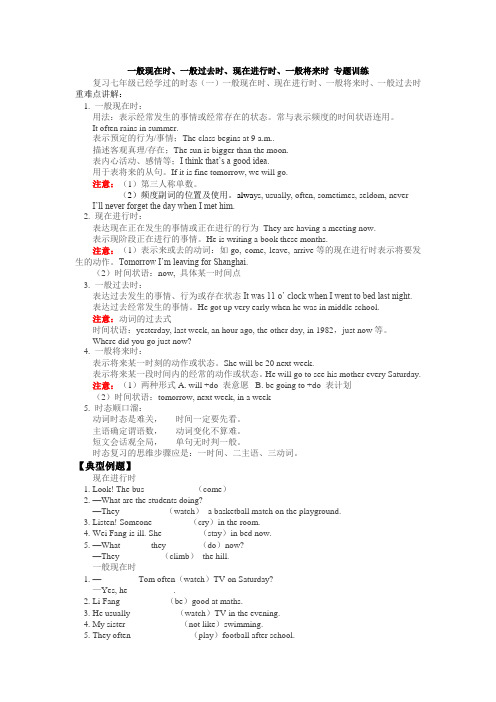
一般现在时、一般过去时、现在进行时、一般将来时专题训练复习七年级已经学过的时态(一)一般现在时、现在进行时、一般将来时、一般过去时重难点讲解:1. 一般现在时:用法:表示经常发生的事情或经常存在的状态。
常与表示频度的时间状语连用。
It often rains in summer.表示预定的行为/事情;The class begins at 9 a.m..描述客观真理/存在;The sun is bigger than the moon.表内心活动、感情等;I think that’s a good idea.用于表将来的从句。
If it is fine tomorrow, we will go.注意:(1)第三人称单数。
(2)频度副词的位置及使用。
alwa ys, usually, often, sometimes, seldom, never I’ll never forget the day when I met him.2. 现在进行时:表达现在正在发生的事情或正在进行的行为They are having a meeting now.表示现阶段正在进行的事情。
He is writing a book these months.注意:(1)表示来或去的动词:如go, come, leave, arrive等的现在进行时表示将要发生的动作。
Tomorrow I’m leaving for Shanghai.(2)时间状语:now, 具体某一时间点3. 一般过去时:表达过去发生的事情、行为或存在状态It was 11 o’ clock when I went to bed last night.表达过去经常发生的事情。
He got up very early when he was in middle school.注意:动词的过去式时间状语:yesterday, last week, an hour ago, the other day, in 1982,just now等。
一般现在时,一般过去时,一般将来时及现在进行时
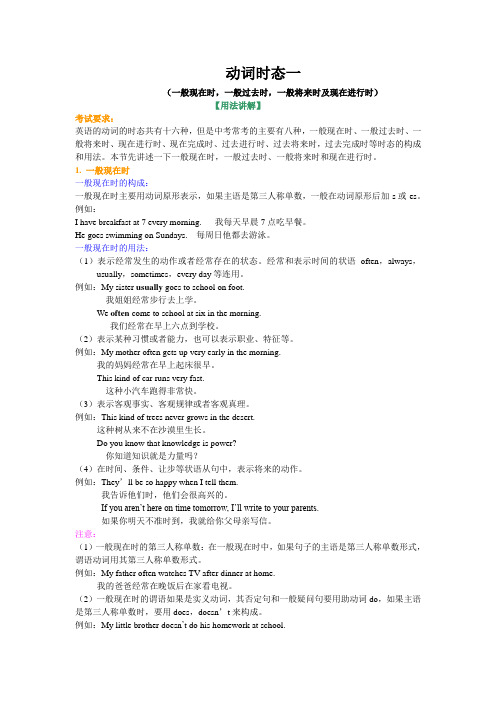
动词时态一(一般现在时,一般过去时,一般将来时及现在进行时)【用法讲解】考试要求:英语的动词的时态共有十六种,但是中考常考的主要有八种,一般现在时、一般过去时、一般将来时、现在进行时、现在完成时、过去进行时、过去将来时,过去完成时等时态的构成和用法。
本节先讲述一下一般现在时,一般过去时、一般将来时和现在进行时。
1. 一般现在时一般现在时的构成:一般现在时主要用动词原形表示,如果主语是第三人称单数,一般在动词原形后加-s或-es。
例如:I have breakfast at 7 every morning. 我每天早晨7点吃早餐。
He goes swimming on Sundays. 每周日他都去游泳。
一般现在时的用法:(1)表示经常发生的动作或者经常存在的状态。
经常和表示时间的状语often,always,usually,sometimes,every day等连用。
例如:My sister usually goes to school on foot.我姐姐经常步行去上学。
We often come to school at six in the morning.我们经常在早上六点到学校。
(2)表示某种习惯或者能力,也可以表示职业、特征等。
例如:My mother often gets up very early in the morning.我的妈妈经常在早上起床很早。
This kind of car runs very fast.这种小汽车跑得非常快。
(3)表示客观事实、客观规律或者客观真理。
例如:This kind of trees never grows in the desert.这种树从来不在沙漠里生长。
Do you know that knowledge is power?你知道知识就是力量吗?(4)在时间、条件、让步等状语从句中,表示将来的动作。
例如:They’ll be so happy when I tell them.我告诉他们时,他们会很高兴的。
一般现在时-现在进行时-一般过去时练习题及答案
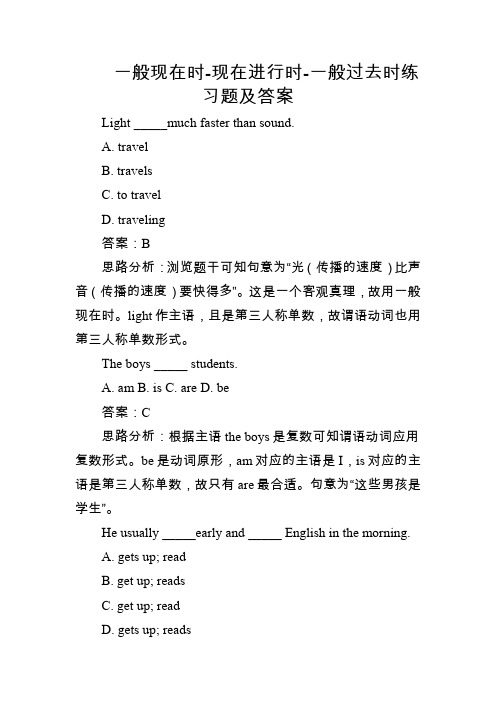
一般现在时-现在进行时-一般过去时练习题及答案Light _____much faster than sound.A. travelB. travelsC. to travelD. traveling答案:B思路分析:浏览题干可知句意为“光(传播的速度)比声音(传播的速度)要快得多”。
这是一个客观真理,故用一般现在时。
light作主语,且是第三人称单数,故谓语动词也用第三人称单数形式。
The boys _____ students.A. amB. isC. areD. be答案:C思路分析:根据主语the boys是复数可知谓语动词应用复数形式。
be是动词原形,am对应的主语是I,is对应的主语是第三人称单数,故只有are最合适。
句意为“这些男孩是学生”。
He usually _____early and _____ English in the morning.A. gets up; readB. get up; readsC. get up; readD. gets up; reads思路分析:浏览题干,usually意为“通常”,是一般现在时的标志词;主语he是第三人称单数,故谓语动词也用单数形式;and连接两个并列的动作,故两个动词都用单数形式。
符合题意的只有D项。
句意为“他通常早晨早起读英语”。
She often _____ supper with her grandmother.A. haveB. hasC. is haveD. is has答案:B思路分析:浏览题干和各选项可知句意为“她经常和奶奶一起吃晚饭”。
表示“吃”的have是实义动词,故句中不可再用系动词is,排除C,D两项;主语she是第三人称单数,故谓语动词也用第三人称单数形式has。
The story _____interesting and we _____it very much.A. sounds; are likingB. is sounding; likeC. sounds; likeD. sound; likes答案:C思路分析:浏览各选项可知sound, like是表示感觉的词,常用于一般现在时。
一般现在时、一般过去时、现在进行时、现在完成时、过去完成时、过去将来时、一般将来时初中全部时态练习题

时态专项复习(一般现在时、现在进行时、一般过去时)一、用动词的正确形式填空1.I ________ (do) my homework every evening.2.We _______ (fly) kites in the park on Sundays.3.My mother _____________ (clean) our room on Sundays.4.Tom ____________(play) the piano every Saturday. Now he____________ (play).5.She ___________(like) swimming. She _____________ (swim) last weekend.ually my mother _______________ (wash) the dishes after lunch. But my grandma_____________ (wash) today.7.Look at the man! He ____________ (read) a magazine.8.Look! The plane ______________ (fly) over the building.9.Listen! My aunt ______________ (sing) in the room.She is a singer. She __________ (like) singing. She _____________(have) a music show. She is excited.10.Tom and Mike always ______________ (swim) in the river. They ___________ (swim) inthe swimming pool three days ago. Look! They ________________ (swim).11.What ____ you usually ______ (do) in the evening? I ______ (play) computer games.12.What _______ you _______ (do) now? I __________ (make) a paper plane.13.What _______ he _______ (do) now? He _____________ (dance).14.What _______ she ______ (do) yesterday? She ______ (visit) her grandparents.15.______ your mother ______ (read) newspaper in the morning? Yes, She ________ .16._______ you _______ (like) fishing? No, I ______ . I like __________ (swim), but my brother ___________ (like).17.How ______ your father _______ (go) to work every day? He _________ (go) by bike. But it cold today. He ___________ (take) the No.21 bus,, and he ____________ (go) to work by taxi yesterday.18._______ the monkey _______ (like) climbing trees? Yes, it _______ .19.What _______ your father ______ (do) after lunch? He _______ (read) a comic book. What_____ he _______(do) today? He _______ (clean) the kitchen for my grandma. Look! He (clean).20. ________ you ______ (collect) stamps? Yes. I _______ .________ your brother ______ (collect), too? No, he ________ .二、选择题1._____ he _____ to the park at 6:30 in the morning? No,he _____ .A. Does; goes; doesB. Does; go; doesn’C.t Does; go; does2.What colour _____ you _____ this bookcase? I _____ it pink.A.are; going to paint; am going to paintB. do; paint; paintC. did; paint; painted3.Tim always _____ a picture at home. He _____ a car now.A. draws; is drawingB. draw; drawC. draws; draw4.She usually _____ her friends. They often _____ tea.A. see; drinkB. sees; drinksC. sees; drink5. He usually _____ the dishes at night, but tonight he _____ clothes.A. wash; washB.washes; is going to washC. is washing; washes6.Mr. Green usually _____ his newspaper in the evening, but he and his wife _____ television yesterday evening.A.reads; watchesB.reads; is going to watchC.reads; watched7. Where are the man and the woman? They _____ near the tree.A. sitB. satC. are sitting8. _____ your penpal _____ diving? No, he _____ .He ______ writing stories.A. Does; like; doesn’ t; likesB.Does; likes; doesn’ t;Clike.Do; like; don’ t; likes9. _____ you _____ fishing yesterday? No, we _____ .A. Does; go; doesn’Bt. Did; go; didn’Ct. Do; go; don’t10.Open the window, Please. Look! He _____ it.A. opensB. is openningC. is opening11.I usually _____ some milk every day. But I _____ coffee yesterday.A. drink; drankB. is drinking; drinkC. drank; am drinking12.Mr. Green often __ his newspapers at night. But he ___ an interesting book tonight.A. reads; readsB. reads; readC. reads; is going to read13.The old man _____ playing sports in the park. He _____ morning exercise now.A. likes; is doingB. likes; doesC. like; doing14.What _____ you usually _____ in the evening? I ______ computer games.What _____ you _____ last night? I _____ a book.A. do; do; play; did; do; readB. did; do; played; do; do; readC. does; do; plays; do; do; am reading15.Where ______ the boy _____ ? He _____ across the river now.A. does; swim; swimsB. is; swimming; is swimming D. is; swimming; is swimming16._____ you _____ to music now? Yes, we _____ .A. Do; listen; doB. Did; listen; didC. Are; listening; are17.Put on you coat, please. OK. I ___ it on. A. am putting B. am going to put C. put18._____ you ______ coffee? Yes, I ______ .A. Do; like; doB. Did; like; didC. Are; like; am19.Look! Two cats ______ across the wall. A. run B. runs C. are running20.She ____ tea, but he ___ . A. likes; doesn B;’ tlike; don’C.t like; doesn’t21.---How many ________ in the tree?---There are two.A. bird are therB. birds is therC. birds are thereD.birds are their22.. Mr Johnson usually goes to the hospital ________.A. by his carB. by the black carC. by carD. by the new car23. Does your brother play ping-pong __________?A. on every afternoonB. every afternoonC. in every afternoonD. at every afternoon24.________ do you usually come to school? A. How B. What C. Which D. How much25.--- Don’ t you usually come to school by bike? ---_________. But I sometimes walk.A. Yes, I doB. No, I don’Ct. Yes, I do D. No, I don’ t26.What ____ Tom and his mother like ? A. does B. do C. is D. are27.What ’ s your hobby? My hobby is ______ model anepl.A. makingB. makeC. makingD. made28.---Did you go to the park on Sunday morning?---___, I went there in the afternoon.A. YesB. NoC. SureD. Sorry29.I don’ t think he’ s so great, but my mom _________. A. do B. doesareC. is D.30.A kid ______ breakfast every morning, because it’ s good for his health.A. have toB. has toC. has to haveD. has to has 现在完成时态练习题1. All the furniture in the building _______ to the company not to his own.A. is belonged B belongs C. belong D are belonged2. When I was at college I _______ three foreign languages, but I _______ all except a few words of each.A. spoke, had forgotten B spoke, have forgotten C had spoken, had forgotten D had spoken, have fo rgotten3.-----We would have walked to the station. It was so near.----- Yes, a taxi _______ at all necessary.A wasn’t Bhadn ’t been C wouldn ’t be D won’t be4.I don ’t really work here. I _______ until the new secretary arrives.A just help outB have just helped outC am just helping outD will just help out5. He _______ his leg when he _______ in a football match.A broke, playedB was breaking, was playingC broke, was playingD was breaking, played6.The new secretary is supposed to report to the manager as soon as she _______.A will arriveB arrivesC is going to arriveD is arriving7.As she _______ newspaper, Granny _______ asleep.A read, was fallingB was reading, fellC was reading , was fallingD read, fall8.---Do you like the material?---Yes, it _______ very soft.A is feelingB feltC feelsD is felt9.---Come on in, Tom. I want to show you something.--- Oh, how nice of you! I _______ you _______ to bring me a gift.A never think, are goingB never thought, were goingC didn ’t think , were goingD hadn ’t thought , were going10.---- You’ veagreed to go, so why aren ’t you getting ready?----But I _______ that you _______ us to start at once.A don ’t realize, wantB don ’t realize, wantedC haven ’t realized, wantD didn ’t realize, wanted11. The house is dirty. We _______it for weeks.A didn ’t cleanB hadn ’t cleanedC don ’t cleanD haven ’t cleaned12.-----_______ the sports meet might be put off.---- Yes, it all depends on the weather.A I ’ vebeen toldB I ’ vetoldC I ’m toldD I told13.---- I ’m sorry to keep you waiting.----Oh, not at all. I _______ here only a few minutes.A have beenB had beenC wasD will be14.You don ’t need to describe her. I _______ her several times.A. had met B have met C met D meet15.The cost of living _______ by ten percent before the government took any action.A was goingB went upC had gone upD has gone up16.By the time new pupil _______ enough courage to raise his hand , the bell for the end of the les son _______.A had gathered ; was already ringingB was gathering ; had already rungC gathered ; already rangD would gather ; would already haverung 17. -----Did you go to Beijing for vacation ?-----I _______ to go , but I got sick at the last minute.A was planningB have plannedC had been planningD have been planning18.------When will they leave ?------They _______ very soon .A do leaveB are leavingC have leftD leave19.------Was he studying for an exam ?------Yes , he's _______ it next week.A doingB to takeC makingD to give20.------Are there going to be many people at your party today ?------We hope that _______.A there will beB there are goingC there areD there going to be21.She must have arrived there last night , _______ she ?A didn'tB haven'tC needn'tD mustn't22._______ the letter , I ran out of the room to the post office.A Since I have finished writingB No sooner than I had finished writingC As soon as I finished writingD After I have finished23. Twelve inches _______ one foot.A will makeB is makingC makesD make24. I _______ going to London next month.A have thought ofB shall think ofC am thinking ofD will think of25. He _______ English for six years by the time he takes his examination.A has studiedB studiedC will have been studyingD had been studying26. By this time next year he _______ from this college.A is graduatingB will have graduatedC should be graduationD will be graduation27. _______ the school when the bell rang.A I hardly had reachedB Hardly had I reachedC I hardly reachedD Hardly did I reach28. He promised us that he _______ early but he _______yet.A would be; hasn't arrivedB is ; hasn't been arrivingC should be ; isn'tarriving D will be ; hadn't arrived29.The teacher told the pupils that the earth _______ round.A isB wouldC wasD were30.The moment they met , they knew that _______ .A they would have friendlinessB they would be friends Cfriendship they would have D friendship would happen31.We _______ the problem for quite some time , but we _______ any conclusion yet.A had discussed ; haven't reachedB discussed ; haven't reachedC have discussed ; haven't been reachingD have been discussing ,haven't reached32.It wasn't until two o'clock that I _______ to sleep.A would goB wentC was goingD had gone33.------Where _______ my book ? I can't see it anywhere.------ I _______ it on this table . But now it's gone .A were you putting ; have putB had you put ; wasputting C have you put ; put D did you put ; have put34.Perhaps it will be a long time _______ from abroad.A that Tom comes backB before Tom comes backC when Tom will come backD when Tom comes back35.If the film _______ is our school , we'll go and see it . Ais to be shown B was shown C is shown D will be shown36.-----How _______ on with your English these days .-----Not bad.A have you been gettingB are you gettingC did you getD have you got37.-----What _______ when I phoned you this morning?------I _______ my homework and was starting to take a boat.A are you doing , have just finishedB were you doing , had justfinished C had you done , just finished D did you do , just finished38. I _______ such an interesting book before.A was never readingB will never readC had never readD have never read39._______ that the earth was the centre of the universe.A People were believingB It was once believedC People were once believedD People were said40.Two of the boys _______ while playing football.A had been hurtB got hurtC were hurtingD hurt41.Prices _______ sharply in the past few years.A have raisedB have been raisedC have been risenD haverisen 42. The number of the students in our school _______ 1200.A is added up toB has been added up toC adds up toD have added up to 43. What he said at the meeting _______ true .A was provedB provedC is provedD proves44.How long do you think the meeting ______A is lastingB is lastedC will lastD lasts45.The May 4th movement ______ in 1919.A had taken placeB was taking placeC was taken placeD took place46. These kinds of shoes ______ well.A were not soldB won't be soldC are not soldD don't sell47.On returning home , I found I ______ umbrella in the office.A had leftB have leftC leftD would leave48.Once you ______ a promise , you must carry it out.A have madeB had madeC madeD is making49. She ______ Charles for a year.A has been married toB has got married toC married withD married50.The singer lived in California until he ______ to university.A had sentB was sendingC had been sentD was sent KEY( 答案 ):1------10:BBACC;BBCBD11----20:DAABC;ADCBB21----30:ACCCC;BBAAB31----40:DBCBC;BBDBB41----50:CDBCD;DAAAD1.单项选择1.He asked me _____ during the summer holidays.A. where I had beenB. where I had goneC. where had I beenD. where had I gone2.What ____ Jane ____ by the time he was sever?A. did, doB. has, done C did, did. D. had, done3.I ______ 900 English words by the time I was ten。
(完整版)一般现在时,一般过去时,现在进行时,一般将来时练习
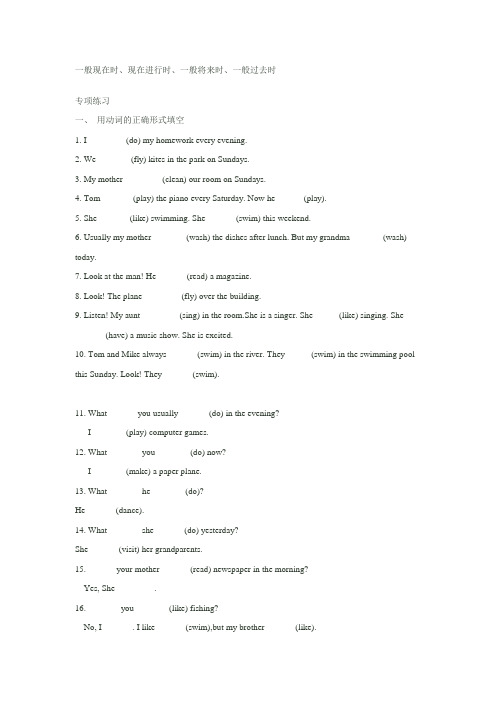
一般现在时、现在进行时、一般将来时、一般过去时专项练习一、用动词的正确形式填空1. I ________ (do) my homework every evening.2. We _______ (fly) kites in the park on Sundays.3. My mother ________ (clean) our room on Sundays.4. Tom _______(play) the piano every Saturday. Now he______ (play).5. She _______(like) swimming. She ______ (swim) this weekend.6. Usually my mother _______ (wash) the dishes after lunch. But my grandma_______ (wash) today.7. Look at the man! He ______ (read) a magazine.8. Look! The plane ________ (fly) over the building.9. Listen! My aunt ________ (sing) in the room.She is a singer. She _____ (like) singing. She_______(have) a music show. She is excited.10. Tom and Mike always ______ (swim) in the river. They _____ (swim) in the swimming pool this Sunday. Look! They ______ (swim).11. What ______ you usually ______ (do) in the evening?I _______ (play) computer games.12. What _______ you _______ (do) now?I _______ (make) a paper plane.13. What _______ he _______ (do)?He ______ (dance).14. What _______ she ______ (do) yesterday?She ______ (visit) her grandparents.15. ______ your mother ______ (read) newspaper in the morning?Yes, She ________ .16. _______ you _______ (like) fishing?No, I ______ . I like ______ (swim),but my brother ______ (like).17. How ______ your father _______ (go) to work every day?He ______ (go) by bike. But it’s cold today. He ______ (take) the No.21 bus,, and he _______ (go) to work by taxi yesterday.18. _______ the monkey _______ (like) climbing trees? Yes, it _______ .19. What _______ your father ______ (do) after lunch? He _______ (read) a comic book. What _____ he _______(do) today? He _______ (clean) the kitchen for my grandma. Look!He (clean).20. ________ you ______ (collect) stamps? Yes. I _______ .________ your brother ______ (collect), too? No, he ________ .二、选择题1. _____ he _____ to the park at 6:30 in the morning? No,he _____ .A. Does; goes; doesB. Does; go; doesn’tC. Does; go; does2. What colour _____ you _____ this bookcase? I _____ it pink.A. are; going to paint; am going to paintB. do; paint; paintC. did; paint; painted3. Tim always _____ a picture at home. He _____ a car now.A. draws; is drawingB. draw; drawC. draws; draw4. She usually _____ her friends. They often _____ tea.A. see; drinkB. sees; drinksC. sees; drink5. He usually _____ the dishes at night, but tonight he _____ clothes.A. wash; washB.washes; is going to washC. is washing; washes6. Mr. Green usually _____ his newspaper in the evening, but he and his wife _____ television yesterday evening.A.reads; watchesB.reads; is going to watchC.reads; watched7. Where are the man and the woman? They _____ near the tree.A. sitB. satC. are sitting8. _____ your penpal _____ diving? No, he _____ .He ______ writing stories.A. Does; like; doesn’t; likesB. Does; likes; doesn’t; likeC. Do; like; don’t; likes9. _____ you _____ fishing yesterday? No, we _____ .A. Does; go; doesn’tB. Did; go; didn’tC. Do; go; don’t10. Open the window, Please. Look! He _____ it.A. opensB. is openningC. is opening11. I usually _____ some milk every day. But I _____ coffee yesterday.A. drink; drankB. is drinking; drinkC. drank; am drinking12. Mr. Green often _____ his newspapers at night. But he _____ an interesting book tonight.A. reads; readsB. reads; readC. reads; is going to read13. The old man _____ playing sports in the park. He _____ morning exercise now.A. likes; is doingB. likes; doesC. like; doing14. What _____ you usually _____ in the evening? I ______ computer games.What _____ you _____ last night? I _____ a book.A. do; do; playB. did; do; playedC. does; do; playsdid; do; read do; do; read do; do; am reading15. Where ______ the boy _____ ? He _____ across the river now.A. does; swim; swimsB. is; swimming; is swimmingD. is; swimming; is swimming16. _____ you _____ to music now? Yes, we _____ .A. Do; listen; doB. Did; listen; didC. Are; listening; are17. Put on you coat, please. OK. I ______ it on.A. am puttingB. am going to putC. put18. _____ you ______ coffee? Yes, I ______ .A. Do; like; doB. Did; like; didC. Are; like; am19. Look! Two cats ______ across the wall.A. runB. runsC. are running20. She _____ tea, but he _____ .A. likes; doesn’t B; like; don’t C. like; doesn’t。
一般现在时、现在进行时、一般将来时、一般过去时知识点总结
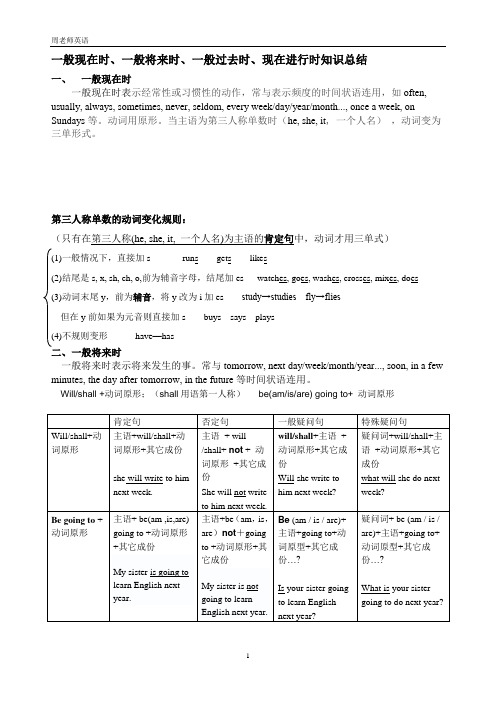
一般现在时、一般将来时、一般过去时、现在进行时知识总结一、一般现在时一般现在时表示经常性或习惯性的动作,常与表示频度的时间状语连用,如often, usually, always, sometimes, never, seldom, every week/day/year/month..., once a week, on Sundays等。
动词用原形。
当主语为第三人称单数时(he, she, it, 一个人名),动词变为三单形式。
第三人称单数的动词变化规则:(只有在第三人称(he, she, it, 一个人名)为主语的肯定句中,动词才用三单式)(1)一般情况下,直接加s runs gets likes(2)结尾是s, x, sh, ch, o,前为辅音字母,结尾加es watches, goes, washes, crosses, mixes, does(3)动词末尾y,前为辅音,将y改为i加es study→studies fly→flies但在y前如果为元音则直接加s buys says plays(4)不规则变形have—has二、一般将来时一般将来时表示将来发生的事。
常与tomorrow, next day/week/month/year..., soon, in a few minutes, the day after tomorrow, in the future等时间状语连用。
Will/shall +动词原形;(shall用语第一人称)be(am/is/are) going to+ 动词原形三、一般过去时一般过去时表示过去某一时候或某一段时间所发生了的事情或存在的状态。
常与过去时间yesterday,ago, this morning,just now,a moment ago,last night / year / week/month,once upon a time,the other day,before,the day before yesterday, in 1989, at the age of five, one day, then(那时), on that day,in the past连用。
- 1、下载文档前请自行甄别文档内容的完整性,平台不提供额外的编辑、内容补充、找答案等附加服务。
- 2、"仅部分预览"的文档,不可在线预览部分如存在完整性等问题,可反馈申请退款(可完整预览的文档不适用该条件!)。
- 3、如文档侵犯您的权益,请联系客服反馈,我们会尽快为您处理(人工客服工作时间:9:00-18:30)。
一般现在时用法及练习题一、用法:1.表示事物或人物的特征、状态。
如:The sky is blue.天空是蓝色的。
2.表示经常性或习惯性的动作。
如:I get up at six every day.我每天六点起床。
3.表示客观现实。
如:The earth goes around the sun.地球绕着太阳转。
二、构成:1. be动词:主语+be(am ,is ,are)+其它。
如:I am a boy.我是一个男孩。
2.行为动词:主语+行为动词(+其它)。
如:We study English.我们学习英语。
当主语为第三人称单数(he, she ,it)时,三单变化:多数在动词后加s ,play—plays like—likes 以s,x,sh,ch,o结尾的动词加es go—goes wash—washes,以辅音字母加y结尾,把y改i再加es,fly—flies 。
第三,我的变化--否定句、一般疑问句、特殊疑问句:1. be动词的变化。
否定句:主语+ be + not +其它。
如:He is not a worker.他不是工人。
一般疑问句:Be +主语+其它。
如:-Are you a student -Yes. I am. / No, I'm not.特殊疑问句:疑问词+一般疑问句。
如:Where is my bike2.行为动词的变化。
否定句:主语+ don't( doesn't ) +动词原形(+其它)。
如:I don't like bread.当主语为第三人称单数时,要用doesn't构成否定句。
如:He doesn't often play.一般疑问句:Do( Does ) +主语+动词原形+其它。
如:- Do you often play football- Yes, I do. / No, I don't.当主语为第三人称单数时,要用does构成一般疑问句。
如:- Does she go to work by bike- Yes, she does. / No, she doesn't.特殊疑问句:疑问词+一般疑问句。
如:How does your father go to work同学们需要掌握的一般现在时第三人称单数形式:Lives, teaches, goes, watches, reads, does, works, does, d oesn’t一般过去式及练习一、基本概念一般过去时(simple past tense)表示过去某个时间里发生的动作或状态;过去习惯性、经常性的动作、行为;过去主语所具备的能力和性格。
二、基本结构主语+动词过去式+其他否定形式①was/were+not;②在行为动词前加didn't,同时还原行为动词主语+do+其他例句She often came to help us in those days. I didn't know you were so busy.一般过去式的构成形式肯定式疑问式否定式疑问否定式I worked Did I work I did not work Did I not workHe(she,it) workedDid he(she,it)work He (she,it)did notworkDid he(she,it)not workWe worked Did we work We did not work Did we not workYou worked Did you work You did not work Did you not workThey worked Did they work They did not work Did they not work三、一般过去时的用法(1)一般过去时表示在过去某个特定时间发生,也可以表示过去习惯性、经常性的动作。
一般过去时不强调动作对现在的影响,只说明过去的事情。
句式:主语+过去动词+宾语+其他如:I had a word with Julia this morning.今天早晨,我跟朱丽亚说了几句话。
He smoked many cigarettes a day until he gave up. 他没有戒烟的那阵子,抽烟抽得可凶了。
(2)一般过去时常与表示过去的时间状语或从句连用,如:yesterday, last week, in 1993, at that time, once, during the war, before, a few days ago, when 等等。
补充内容:(句子中谓语动词是用一般过去时还是用现在完成时,取决于动作是否对现在有影响。
Have you had your lunch 你吃过午饭了吗(你现在不饿吗)Yes, I have. 是的,我已经吃过了。
(已经吃饱了,不想再吃了。
)When did you have it 你是什么时候吃的(关心的是吃的动作发生在何时。
)I had it about ten minutes ago. 我大约是十分钟以前吃的。
)Used to do something 表示过去常做而现在已经停止了的习惯动作。
I used to work fourteen hours a day. 我过去常常一天干十四个小时。
I ate it at 6:45。
我在六点四十五分吃了。
注意:1、带有确定的过去时间状语时,要用过去时如:yesterday(昨天)、two days ago…(两天前……)、last year…(去年…)、the other day(前几天)、once upon a time(很久以前)、 just now (刚才)、in the old days(过去的日子里)、before liberation(解放前…)、 When I was 8 years old (当我八岁时…)、at+一个时间点Did you have a party the other day 前几天,你们开了晚会了吗Lei Feng was a good soldier. 雷锋是个好战士。
另外,在谈到已死去的人的情况时,多用过去时。
2、表示过去连续发生的动作时,要用过去时这种情况下,往往没有表示过去的时间状语,而通过上下文来表示。
The boy opened his eyes for a moment,looked at the captain,and then died. 那男孩把眼睛张开了一会儿,看看船长,然后就去世了。
3、表示过去一段时间内经常或反复的动作,常与always,never等连用。
Mrs. Peter always carried an umbrella. 彼得太太过去老是带着一把伞。
(只是说明她过去的动作,不表明她现在是否常带着伞。
)比较Mrs. Peter always carries an umbrella. 彼得太太老是带着伞。
(说明这是她的习惯,表明她现在仍然还习惯总带着一把伞)Mrs. Peter is always carrying an umbrella. 彼得太太总是带着一把伞。
(表示说话者对这一动作或行为厌烦)I never drank wine.我以前从不喝酒。
(不涉及到现在,不说明现在是否喝酒)4、如果强调已经终止的习惯时要用 used to do(过去常常做,而现在不那样做了) He used to drink. 他过去喝酒。
(意味着他现在不喝酒了。
喝酒这个动作终止了)I used to take a walk in the morning. 我过去是在早晨散步。
(意味着现在不在早晨散步了)比较:I took a walk in the morning. 我曾经在早晨散过步。
(只是说明过去这一动作)5、有些句子,虽然没有表示过去确定时间的状语,但实际上是指过去发生的动作或存在的状态的话,也要用过去时,这一点,我们中国学生往往出错,要特别注意!I don't know you were in Paris. 我不知道你在巴黎。
(因为在说话时,我已经知道你在巴黎了。
这句话指的是说话之前,所以只能用过去时表示。
实际上,这句话暗指:But now I know you are here.)I think you were ill. 我以为你病了呢。
(这句话应是在说话之前,我以为你病了。
但是现在我知道你没病)四、一般过去时谓语部分的构成1. Be 动词的一般过去时态.在没有实义动词的句子中使用be动词, am is 的过去式为was; are的过去式为were. 构成:肯定句:主语+was (were) +表语如:I was late yesterday. (昨天我迟到了。
)否定句:主语+was (were) +not+表语如:We weren't late yesterday. (我们昨天没迟到) 疑问句:Was (Were) +主语+表语如: Were you ill yesterday (你昨天病了吗)肯定回答: Yes, I was. (是的,我病了。
) 否定句: No, I wasn't. (不,我没病。
) 特殊疑问句:特殊疑问词+was (were) +主语+表语如:When were you born 你是什么时候出生的2.实义动词的一般过去时态肯定句要使用动词的过去式,否定句和疑问句要使用助动词do和 does 的过去式 did. 肯定句为:主语+动词过去式+宾语如: I went home at nine o'clock yesterday.(我昨天九点钟回的家。
)否定句:主语+didn't +动词原形+宾语如:I didn't go home yesterday. (我昨天没回家。
) 疑问句:Did +主语+动词原形+宾语如: Did you go home yesterday (你昨天回家了吗) 肯定回答: Yes, I did. (是的,我回了。
) 否定回答:No, I didn't. (不,我没回家。
) 3.助动词和情态动词过去式如下:shall―should(将要)用于第一人称单数will―would(将要)用于所有人称can—could (能,会) may―might(可以) must―must (必须)have to―had to(不得不)助动词和情态动词的过去时态要使用他们的过去式,后面的动词还使用原形。
如: I had to do my homework yesterday. (昨天我不得不做作业。
